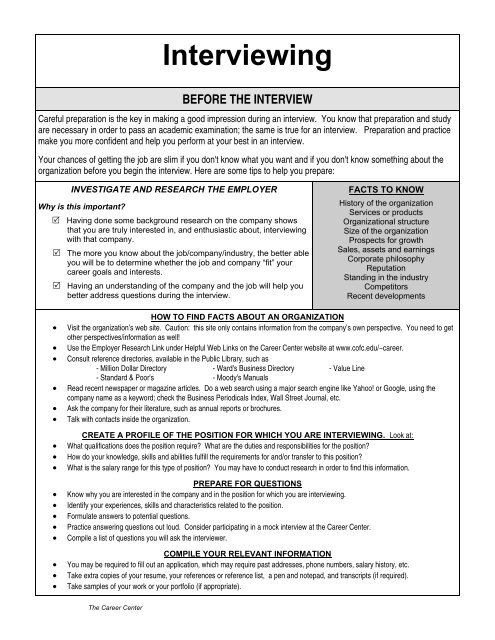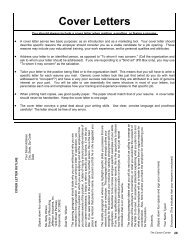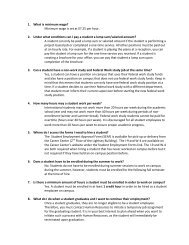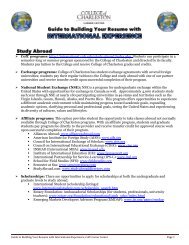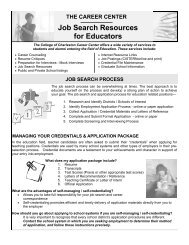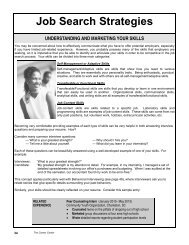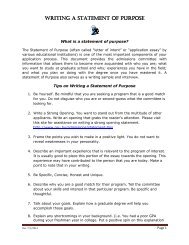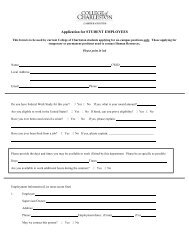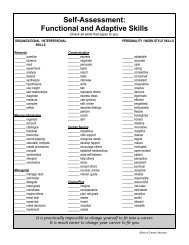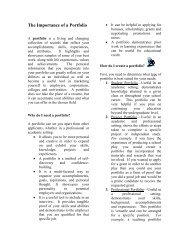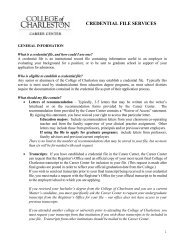Interview Skills Packet - Career Center - College of Charleston
Interview Skills Packet - Career Center - College of Charleston
Interview Skills Packet - Career Center - College of Charleston
Create successful ePaper yourself
Turn your PDF publications into a flip-book with our unique Google optimized e-Paper software.
<strong>Interview</strong>ingINTERVIEW ESSENTIALSMAKING A GOOD FIRST IMPRESSION• Plan to arrive at least 10 minutes early. Account for possible traffic congestion.• Introduce yourself to the receptionist and indicate whom you are there to see. The interviewstarts the minute your enter the door and doesn’t end until you leave.• Pay attention to the interviewer’s name and repeat his/her name when your greet him/her.YOUR ATTITUDE• Show confidence, interest, assertiveness, and enthusiasm. Do not be arrogant, aggressive, orimmature.• Be yourself. Smile. Be friendly (but not “chummy”), not stiff or alo<strong>of</strong>.• Be courteous, polite, and respectful at all times.• Allow the interviewer to lead the interview.VERBAL COMMUNICATION• Use proper grammar. Avoid using “um,” “like” and “you know.”• Think about your answers before speaking. It’s okay to pauseand collect your thoughts before answering.• Express yourself clearly and succinctly.• Make sure you answer the question asked. Validate or repeatthe question if necessary to make sure you understand what is being asked.• Keep your answers brief and to-the-point.NONVERBAL COMMUNICATION• Shake hands firmly with the interviewer and with anyone else to whom you are introduced.• Make eye contact when speaking to someone.• Wait until you are <strong>of</strong>fered a seat or until the interviewer sits.• Be aware <strong>of</strong> your posture – stand tall, sit up straight, and lean slightly forward in your chair duringthe interview.• Beware <strong>of</strong> talking with your hands too much.ANSWERING QUESTIONS• Avoid sounding as if you have memorized answers to questions – the interview should be anatural flow <strong>of</strong> conversation. If you sound too “rehearsed” your interview will not be effective.• Explain how you would accomplish a task rather than just saying that you could do it. Usespecific examples to exhibit your strengths, skills, and abilities.• Admit a “mental block” if you can’t think <strong>of</strong> an answer.• Don’t be evasive. While past failures or problems need not be volunteered, don’t try to coverthem up. If you do have a “blemish” in your past, simply explain the circumstances without givingexcuses or blaming others. Discuss what you have learned from the situation.• Never speak poorly about former supervisors, colleagues, or employers. If you were unhappy,simply explain that it was not a good fit.• Don’t discuss personal issues or problems during the interview.• Don’t volunteer more information than you are asked for- you might talk yourself out <strong>of</strong> a job!ENDING THE INTERVIEW• Indicate your interest in the position.• Summarize, giving specific examples <strong>of</strong> your knowledge, skills, and abilities, why you would be agood candidate for the position.The <strong>Career</strong> <strong>Center</strong>
<strong>Interview</strong>ingBEHAVIORAL INTERVIEWOne <strong>of</strong> the most common methods <strong>of</strong> asking questions, behavioral interviewing focuses on specificexamples <strong>of</strong> past behavior as a means <strong>of</strong> predicting future behavior. Questions such as, “Tell me about atime when….” Are typically asked in a behavioral interview. Use the STAR method to respond tobehavioral questions.Situation: Discuss a specific situation or problem that you encountered.Task: Explain the task you had to complete or the ideas you used for resolving the problem.Action: Tell specific actions which you took, steps you followed, or obstacles you overcame.Results: Highlight outcomes, goals achieved, accomplishments, etc.Analytical/Problem Solving• Tell me about a time when you had to analyze informationand make a recommendation.• Give an example <strong>of</strong> when you identified potentialproblems and resolved the situation.Communication• Give me an example <strong>of</strong> a time when you were able tosuccessfully communicate with a person even when thatindividual may not have personally liked you (or viceversa).• Give me an example <strong>of</strong> a time when you had to handle anirate customer.• Describe a situation in which you were able to usepersuasion to successfully convince someone to seethings your way.Creativity/Innovation• Describe the most significant or creative presentation/ideathat you have developed or implemented.• Give me an example <strong>of</strong> a time when you came up with aninnovative solution to a challenge your company, class ororganization was facing.Decision Making• Tell me about a difficult decision you have had to make.How did you approach it? What was the result?• Describe a situation in which you had to make a decisionwith out all the information you needed.Flexibility• By providing specific example, demonstrate that you canadapt to a wide variety <strong>of</strong> people, situations, and/or workenvironments.• Tell me about a time when you had to be tolerant <strong>of</strong> anopinion that was different from yours.Goal Setting• Give an example <strong>of</strong> an important goal that you have setand then tell me how you have reached it.• Tell me about a goal you did not reach.Integrity/Honesty• Tell me about a time when you took an unpopular stanceand stood firm on your position.• Give a specific example <strong>of</strong> a policy you conformed to withwhich you did not agree.Interpersonal• Give me an example <strong>of</strong> a time you had to work with adifficult person.• Describe a situation where you had a conflict with anotherindividual and how you dealt with it.Leadership/Initiative• Describe a leadership situation that you would handledifferently if you had to do it over again.• Tell me about a time when you were in a leadership roleand were faced with resistance.Organization/Time Management• Give me a specific example <strong>of</strong> a time when you wereunable to complete a project on time.• Give an example <strong>of</strong> a recent assignment that required thegreatest amount <strong>of</strong> effort with regard to organization.Strengths/Weaknesses• Describe a time when you failed at something and howyou responded.• Tell me about a time when you did not live up to your fullpotential.Teamwork• Tell me about a time when you worked on a team and amember was not doing their share <strong>of</strong> the work.• Describe your involvement with a team project.The <strong>Career</strong> <strong>Center</strong>
Questions <strong>Interview</strong>ers AskPersonal:1. Tell me about yourself.(Expand on your resume in two minutes orless. Do not discuss personal information).2. What are your hobbies?3. Why are you interested in our organization?4. What do you know about our organization?5. Describe your ideal job.6. What do you consider to be your strengths/weaknesses?7. What 2 or 3 accomplishments have given youthe most satisfaction and why?8. Who are your role models? Why?9. What motivates you most in a job?10. Have you ever had difficulty in getting alongwith a former supervisor/co-worker? How didyou handle it?11. What was the most useful criticism you’ve everreceived, and who was it from?12. Do you prefer large or small organizations?Why?13. What have you learned from your mistakes?Education:1. Why did you choose your major/college/university?2. In which campus activities did you participate?What did you learn from these experiences?3. Which classes did you like best/least? Why?4. If you were to start your college career overagain, what would do differently, and why?5. What is your grade point average? Does thisaccurately reflect your ability? Why / why not?TRADITIONAL INTERVIEW6. Have you held any leadership roles? What isyour leadership style?7. Were you financially responsible for anyportion <strong>of</strong> your college education?Experience:1. What job related skills have you developed?2. Describe your previous work experience. Whatwere your responsibilities? What did youlearn?3. How does your college education or workexperience relate to this job?4. Which job did you enjoy most? Least? Why?5. Have you ever quit a job? Why?6. How do you think a former supervisor woulddescribe your work?7. In what ways do you think you could make acontribution to this company?<strong>Career</strong> Goals/Other:1. What are your short-term goals? Long-termgoals?2. Do you prefer to work under supervision or onyour own?3. What qualities do you look for in a supervisor?4. What are your thoughts about relocation?What geographic location do you prefer?5. Describe your ideal work environment.6. Why do you think you would be successful inthis career?7. What are your plans for continued education?8. Why should we hire you?Handling Inappropriate or Illegal QuestionsIllegal questions are those relating to issues <strong>of</strong> race, color, gender, national origin, age, or religious affiliation. Some inappropriatequestions that may lead to legal liability include those pertaining to marital status, medical history, children, or pregnancy. Theinterviewer may or may not intentionally be asking illegal or inappropriate questions. You have several options as to how you respond ifthis occurs:• Address the concern expressed by the question, rather than addressing the question itself. For example, should an employer askif you have children, you might respond by saying, “If you are asking me if I can travel or work overtime if necessary, I can.”• Indicate that you wish to provide necessary information, but you are having difficulty in understanding the relevancy <strong>of</strong> the questionin relation to the requirements <strong>of</strong> the job. Try to remain pr<strong>of</strong>essional and tactful while still protecting your rights.• If you believe that the interviewer is purposefully asking illegal or inappropriate questions, you may choose to end the interview andinform the human resources department <strong>of</strong> the company or make a complaint with the nearest Equal Employment OpportunityCommission <strong>of</strong>fice.If you are asked inappropriate or illegal questions by a company recruiting at the <strong>College</strong> <strong>of</strong> <strong>Charleston</strong>, be sure to inform a <strong>Career</strong><strong>Center</strong> staff member.The <strong>Career</strong> <strong>Center</strong>
<strong>Interview</strong>ingINTERVIEW QUESTIONS TO ASKYou are expected to ask questions about the position or the company during an interview. Thesequestions should relate to the specific requirements <strong>of</strong> the job and/or should show you’ve done researchinto the organization. Do not ask questions regarding information that was available on the company’swebsite or literature! This will show you haven’t done your research!About the Job• What are some <strong>of</strong> the skills and abilities necessary for someone tosucceed in this job?• What are the traits and skills <strong>of</strong> people who are the most successfulwithin this organization?• What do you consider to be the most challenging aspects <strong>of</strong> this job?• How is performance measured and reviewed?• What are some objectives you would like to see accomplished in thisjob?• Is this a new position or a replacement?• Why did the last person leave this job?• What kind <strong>of</strong> work might I be doing in the first six months <strong>of</strong> the job?• What is your method <strong>of</strong> training and orienting new employees?• Can you describe a typical day for someone in this position?• What is the top priority for someone who accepts this job?• When do you expect to make a decision on this position?About the Department• How many employees are in this department?• Who are the other persons with whom I would work in this position?• With what other key individuals/groups does this person interface?About the Company• What are the company’s values?• Could you explain your organizational structure to me?• Where does this position fit in the organization?• Can you describe the company’s management style?• How would you describe your company’s management style and thetype <strong>of</strong> employee who fits well with it?• What is the company’s policy regarding ongoing training andeducation so that employees can keep up with their skills or acquirenew ones?About the Future• What are the company’s future growth/expansion plans?• What are major changes in the industry, and how is the companyresponding?• What do you think is the greatest opportunity facing the organizationin the near future? The biggest threat?Deadly Questions to Askin an <strong>Interview</strong>What is the salary for this job?Do not ask about salary until the interviewerhas raised the subject. This may not happenuntil the second interview or until a job <strong>of</strong>fer isextended. As curious as you may be, youmust be patient or risk leaving the impressionthat you are more interested in money than inbeing a team player. Also, if you wait until ajob <strong>of</strong>fer is extended, you have morenegotiating power regarding salary than ifdiscussed at an earlier point while theemployer is still considering other candidatesfor the position.How much vacation and sick leave will I get?Asking about these issues makes you seem asif you are asking for time <strong>of</strong>f before you haveeven started the job. You should be briefed onbenefits at the appropriate time. If not, justask, "What are the benefits associated with thisposition?" when the salary issue has beenraised. (Check the organization’s web site forinformation regarding benefits.)When will I be promoted?This question is impossible to answer.Promotion depends on timing (such as growthand turnover) and your performance andcannot be determined in advance <strong>of</strong> anevaluation <strong>of</strong> your performance on the job.The <strong>Career</strong> <strong>Center</strong>
<strong>Interview</strong>ingAFTER THE INTERVIEW Ask for a business card at the close <strong>of</strong> the interview to ensure that you have proper contact information. Thank the interviewer(s) for their time and shake hands firmly. Indicate that you look forward to hearing from them soon and welcome them to contact you if they needany additional information. Send a thank-you letter within 48 hours reiterating your interest in the position.If you do not hear from the employer within the time frame indicated, make a follow-up phone call to lethim/her know you are still interested in the position and to find out if there are additional questions youmight address.SECOND INTERVIEW / SITE VISITYou may be asked for a second interview after your initial screening interview. If the initial interview washeld at a location other than at the company's facility (i.e. the <strong>Career</strong> <strong>Center</strong>), you may be asked to visitthe company's <strong>of</strong>fices for this subsequent interview. The follow-up interview will allow for a more in-depthconversation with the employer and <strong>of</strong>ten with additional members <strong>of</strong> the organization. An invitation for afollow-up interview suggests that the employer is very interested in considering you for employment.PREPARING FOR THE INTERVIEW• Be sure to get a good night's rest the night before and recognizethat this will be a stressful event.• You will be expected to expand upon the areas you discussed inyour first interview, and you will have more opportunities to askquestions. Be prepared to do so.• Plan to spend most <strong>of</strong> one day for this interview.DURING THE SECOND INTERVIEW/SITE VISIT• Be pr<strong>of</strong>essional at all times – from interviews to dinnerengagements. These are not social events. Stay away frommessy foods and from alcoholic beverages.• Stay away from ordering the most expensive or least expensiveitem on the menu if your visit includes a dinner engagement.• You may be asked to take a test on anything from your basic skillsto your personality. Relax, take your time, and do your best.• You should view the second interview as an opportunity to evaluatethe company and decide if this is an organization you want to workfor.AFTER THE INTERVIEW• If you are asked for feedback about your experiences in the secondinterview, be positive and constructive if you are interested in theposition.• After the interview, review and record your recollections. This willbe helpful if you are interviewing with a number <strong>of</strong> companies andwant to compare them on several points.• Write a thank-you letter to each person with whom you spent aportion <strong>of</strong> the day.TRAVELING FOR AN INTERVIEW• Be sure to check your schedule regarding classes,tests, and so forth before confirming a date for afollow-up interview, as prior arrangements may haveto be made with pr<strong>of</strong>essors and for travel. Theemployer will most likely be willing to work with you inarranging suitable dates for your interview.• The company contact person should provide you withan itinerary <strong>of</strong> what will be involved in the secondinterview/site visit. It is acceptable to request anitinerary, information on how to dress, and items youshould provide, such as college transcripts.• Travel arrangements can be handled in a number <strong>of</strong>ways. You may be asked to make your ownarrangements or the organization may coordinateyour travel arrangements.• If the company is making your travel arrangements,verify what expenses will be prepaid and whatexpenses will be reimbursed. If the employer ispaying for your hotel expenses, be considerate <strong>of</strong>this, and do not charge personal calls to your room,order pay-for-view movies, etc. If you are to bereimbursed for expenses, keep receipts anddocument the mileage on your personal car.• Be sure you have clear directions to your hotel and tothe location <strong>of</strong> your interview. Check on parkingoptions if you are driving.• Take a major credit card and/or cash to handleunexpected expenses and incidentals.The <strong>Career</strong> <strong>Center</strong>
Many employers choose to conduct screening interviews over the telephone, especially when thecompany is located in a different geographic area than you. The phone interview may be used todetermine if a face-to-face interview is justified.Since you never know when you might receive an unexpected call from an employer, check yourvoice mail greeting. Is it pr<strong>of</strong>essional? Remember, first impressions count!• Keep a copy <strong>of</strong> your resume, your calendar, andemployer research material within easy reach <strong>of</strong>the phone.• Have a notepad and pen handy to keep notes.• Put a “Do Not Disturb” sign on your door.• Have a glass <strong>of</strong> water handy.• Turn <strong>of</strong>f call waiting on your phone!• Stand up during the interview. You will be morealert, and your response time will be improved.• Smile! Your composure comes through evenwhen the caller can’t see you.• Immediately write down the recruiter’s name!<strong>Interview</strong>ingTHE TELEPHONE INTERVIEW• If a question catches you <strong>of</strong>f guard, ask for amoment to think about it, and then do your best.• Ask follow up questions: “What are the nextsteps in the interviewing process?” “Whatqualities are you seeking in the candidate wh<strong>of</strong>ills this position?”• Remember to say thank you at the end <strong>of</strong> theinterview, and express your interest in theposition.• Send a formal thank-you letter, along with anyinformation the interviewer might haverequested.JOB OFFERSRECEIVING A JOB OFFER:ACCEPTING A JOB OFFER:When you receive a job <strong>of</strong>fer, acknowledge the <strong>of</strong>fer byresponding either verbally or in writing to theemployer, even if you are not ready to accept or declinethe job. Remember to thank the employer for <strong>of</strong>feringyou the position, and ask for clarification <strong>of</strong> the terms <strong>of</strong>employment if necessary.If you need to ask for an extension <strong>of</strong> time in order toconsider your decision:• Express to the employer your strong interest in theexisting <strong>of</strong>fer.• Ask for enough time in order to explore your otheroptions.• Mutually agree with the employer on a date for yourdecision.• Honor your commitment and respond to the employerby the established date.• Be aware that the employer may or may not grantyour request for an extension. However, mostemployers understand the fact that you may need toconsider various options before making a decision <strong>of</strong>this magnitude.• Don’t accept a job <strong>of</strong>fer until you are completelycertain you are committed.• Respond to the <strong>of</strong>fer in a timely manner.• Don’t back out (or renege) after accepting a job <strong>of</strong>fer.This is considered to be a breech <strong>of</strong> ethics.• Once you have accepted a job <strong>of</strong>fer, notify any otheremployers with whom you were in discussions aboutemployment to inform them that you are no longer acandidate. Cancel any upcoming interviews in acourteous way, explaining that you have acceptedanother job <strong>of</strong>fer. Notify the <strong>Career</strong> <strong>Center</strong> via e-mail or phone that you are employed, and provide thename <strong>of</strong> the company.DECLINING A JOB OFFER:• Respond to the job <strong>of</strong>fer in a timely manner. Bepr<strong>of</strong>essional and courteous at all times.• Thank the person extending the <strong>of</strong>fer, and brieflyexplain why you are rejecting it. A general statementthat another <strong>of</strong>fer is a better fit with your career goalsand interests, without going into specifics, wouldsuffice.The <strong>Career</strong> <strong>Center</strong>
Receiving a Job OfferSUCCESSFUL SALARY NEGOTIATIONSREASONS TO NEGOTIATE SALARY1. When you know the pay range for the position is less than the industry average2. When you know that the cost <strong>of</strong> living is higher in the area where the job is and thesalary does not reflect that3. When you have been made multiple <strong>of</strong>fers with similar salary and benefitspackages4. When you know that your skills, experience and education are worth more thanthe <strong>of</strong>fered amountHAVE THE FACTS / DO YOUR HOMEWORK• Find out what your skills and level <strong>of</strong> experience are worth in the job market.• Know what the job is worth by studying salary surveys and researching what similar jobs pay.• Consider benefits as well as salary. Benefits packages can be worth up to one-third <strong>of</strong> your totalcompensation package.• Investigate cost <strong>of</strong> living adjustments to salary basedon employment location.HANDLING REJECTIONWHEN TO NEGOTIATE• Wait to begin salary negotiations until the end <strong>of</strong> theinterview process – after the employer has decided tohire you.• If/when asked what your salary requirements are by apotential employer during an interview, indicate aRANGE, not a dollar amount. This range should beslightly higher than the low end <strong>of</strong> your range.HOW TO NEGOTIATE• Once the employer has named the salary, if you wishto negotiate, be prepared to make a counter<strong>of</strong>fer. Ifthe <strong>of</strong>fer is lower than you expected, you can indicatethat it is lower than you expected based on yourresearch. Be prepared to specify where you obtainedyour information! Then counter <strong>of</strong>fer with your researchresponse and desired range. They will respond withwhat they are able, or not able, to <strong>of</strong>fer. Sometimes thismay involve getting back to you.• Be realistic! Don’t be arrogant or ask for a salary that isUnfortunately, not all interviews result in a job<strong>of</strong>fer. (If there were 50 candidates and 1 job, thatmeans 49 people got rejection letters!)Competition for jobs is intense with large, wellqualifiedapplicant pools for specific positions.Even if you aren't the most qualified applicant,you can compensate for that fact by being wellprepared,by practicing your interview skills, andby exhibiting a pr<strong>of</strong>essional demeanor. However,in some instances, this still will not result in a job.Rejections are a normal part <strong>of</strong> the process, andyou should not be discouraged when thishappens. If you allow a rejection to discourageyou or to damage your confidence, this may havea negative impact on your performance in yournext interview, which could lead to anotherrejection. Try instead to learn from eachinterview in order to be better at the next one.higher than the top <strong>of</strong> the salary range for the position, especially if you are a new graduate without skills/experience relating to the job.• Don’t use personal problems or needs in negotiations. This will hurt, rather than help, your chances.• Salary is not the only area to negotiate. If the employer cannot negotiate salary, realize that you mayhave other options. These include: bonuses, retirement or pension plans, stock options, company car/expense accounts, relocation/moving expenses, and so forth. The position and the company will dictatewhat is <strong>of</strong>fered and what is negotiable.• Know when to say when. If you feel that the employer is becoming frustrated with your proposals orstates that this is all they can do for you, stop and evaluate what is on the table. You do not want to givethe impression that you are impatient or greedy. When the company comes back with their final <strong>of</strong>fer, beprepared to evaluate the <strong>of</strong>fer and make a decision.The <strong>Career</strong> <strong>Center</strong>


